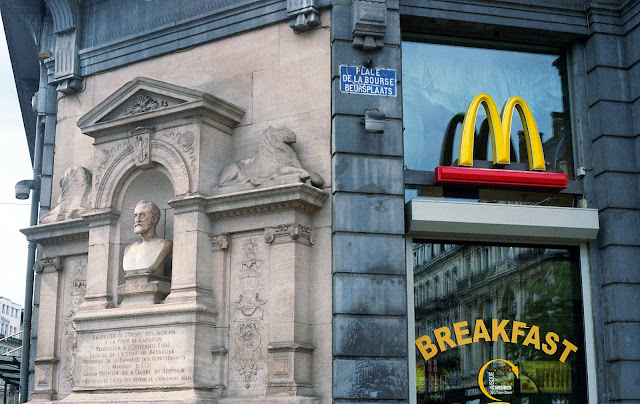Organizational Culture and Strategy of McDonald's: A Global Fast Food Phenomenon
Introduction
Organizational culture and strategy are key elements that shape the success and identity of companies. In this article, we will explore the organizational culture and strategy of McDonald's, one of the world's most recognized and pervasive fast-food chains. We will discuss how McDonald's adapts its culture and strategy in Russia and other parts of the world while maintaining its global brand image.
Organizational Culture
Mcdonald's organizational culture is characterized by several key elements that contribute to its identity and success:
Consistency and Efficiency
Consistency and efficiency are integral to McDonald's culture. The company places great emphasis on delivering the same high-quality products and services across its global network of restaurants. McDonald's culture ensures that customers can expect a familiar experience, regardless of the location they visit.
Customer Focus
Customer focus is at the core of McDonald's culture. The company aims to provide fast and friendly service, catering to the needs and preferences of its diverse customer base. McDonald's culture emphasizes delivering a positive dining experience, ensuring customer satisfaction and loyalty.
Teamwork and Training
Teamwork and training are vital aspects of McDonald's culture. The company fosters a collaborative environment, where employees work together to achieve operational efficiency and excellence. McDonald's provides comprehensive training programs to ensure consistent service quality and uphold its brand standards.
Diversity and Inclusion
Diversity and inclusion are valued within McDonald's culture. The company recognizes the importance of representing and embracing various cultures, backgrounds, and perspectives. McDonald's strives to create an inclusive workplace that reflects the diversity of its customers and communities.
Organizational Strategy
McDonald's organizational strategy revolves around several key pillars that drive its operations and market positioning:
Standardization and Adaptation
McDonald's strategy combines standardization and adaptation to cater to local markets. The company maintains core menu items that are consistent across the globe, ensuring the familiar McDonald's experience. However, McDonald's also adapts its menu and offerings to suit local tastes and preferences, allowing for regional variations.
Expansion and Franchising
McDonald's growth strategy focuses on expansion and franchising. The company aims to continuously expand its global footprint by opening new restaurants in various locations. McDonald's franchise model enables local entrepreneurs to operate and manage restaurants, fostering entrepreneurship and providing opportunities for local business development.
Digital Transformation
Digital transformation is a key element of McDonald's strategy. The company embraces technology to enhance customer experiences and streamline operations. McDonald's has invested in mobile ordering, self-service kiosks, and delivery services, providing customers with convenient ways to access its products.
Sustainability and Responsibility
Sustainability and corporate responsibility are fundamental to McDonald's strategy. The company is committed to environmental stewardship, responsible sourcing, and community engagement. McDonald's focuses on initiatives such as waste reduction, renewable energy, and supporting local communities to contribute positively to society.
Cultural and Strategic Alignment
Mcdonald's organizational culture and strategy align to ensure consistent brand delivery and global success. The culture of consistency, customer focus, teamwork, and diversity supports McDonald's strategic pillars.
The emphasis on consistency within McDonald's culture aligns with its standardization and adaptation strategy. The company's customer-focused culture complements its expansion efforts, as it aims to provide a positive experience for customers worldwide. The culture of teamwork and training supports McDonald's franchising model, enabling franchisees to uphold the company's brand standards.
Furthermore, McDonald's culture of diversity and inclusion aligns with its sustainability and responsibility strategy, as it reflects the company's commitment to making a positive impact on society and the environment.
McDonald's in Russia and Beyond
In Russia and other parts of the world, McDonald's adapts its culture and strategy to local markets while maintaining its global brand identity. In Russia, McDonald's has successfully integrated itself into the local culture by offering menu items that cater to Russian tastes and preferences, such as the popular "Blini" breakfast option. McDonald's in Russia also actively engages in community initiatives and sponsorships to establish a positive brand image.
Similarly, in other countries, McDonald's adapts its menu and marketing strategies to suit local cultural preferences. For example, in India, McDonald's offers vegetarian and non-beef options to cater to the country's dietary preferences. McDonald's also collaborates with local suppliers to source ingredients and support local economies.
In conclusion, McDonald's organizational culture and strategy have played a significant role in its global success. The culture of consistency, customer focus, teamwork, and diversity aligns with its strategic pillars of standardization, expansion, digital transformation, and sustainability. By adapting its culture and strategy to local markets, McDonald's maintains its global brand image while resonating with customers worldwide.





